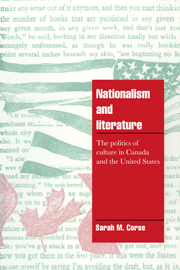Book contents
- Frontmatter
- Contents
- List of tables
- Acknowledgments
- 1 Introduction: cultural fields and literary use
- 2 Nation-building and the historical timing of a national literature in the United States
- 3 Nation-building and the historical timing of a national literature in Canada
- 4 The canonical novels: the politics of cultural nationalism
- 5 The literary prize winners: revision and renewal
- 6 The bestsellers: the economics of publishing and the convergence of popular taste
- 7 Literary meaning and cultural use
- Appendix A The canonical novels
- Appendix B The literary prize winners (1978–1987)
- Appendix C The bestsellers (1978–1987)
- Appendix D Coding sheet
- Appendix E Generic categories
- References
- Index
4 - The canonical novels: the politics of cultural nationalism
Published online by Cambridge University Press: 11 May 2010
- Frontmatter
- Contents
- List of tables
- Acknowledgments
- 1 Introduction: cultural fields and literary use
- 2 Nation-building and the historical timing of a national literature in the United States
- 3 Nation-building and the historical timing of a national literature in Canada
- 4 The canonical novels: the politics of cultural nationalism
- 5 The literary prize winners: revision and renewal
- 6 The bestsellers: the economics of publishing and the convergence of popular taste
- 7 Literary meaning and cultural use
- Appendix A The canonical novels
- Appendix B The literary prize winners (1978–1987)
- Appendix C The bestsellers (1978–1987)
- Appendix D Coding sheet
- Appendix E Generic categories
- References
- Index
Summary
Gatsby turned out all right at the end; it is what preyed on Gatsby, what foul dust floated in the wake of his dreams that … closed out my interest in … men … careless people … [who] smashed up things and creatures and then retreated back into their money or their vast carelessness … and let other people clean up the mess they had made
(Fitzgerald [1925] 1953: 2, 180–1).True resignation meant accepting … the burden of leadership; and the moment he saw that he felt at one with the district, with his brother-in-law who had told him his story, with Ruth in her sorrow, and, strangely, with himself; for here was something to do once more … His own life had been wrong, or all this would not have happened. He had lived to himself and had to learn that it could not be done
(Grove [1933] 1965: 264).In chapters 2 and 3 I showed that historical patterns of national canon formation clearly demonstrate the relationship between literature and nation-building in the United States as far back as the eighteenth century and in Canada in the nineteenth, and particularly, twentieth centuries. In chapter 4, I turn from a consideration of the historical contexts of canon formation to an empirical comparison that demonstrates how the idea of unique national literatures is manifested in the canonical texts of the United States and Canada.
- Type
- Chapter
- Information
- Nationalism and LiteratureThe Politics of Culture in Canada and the United States, pp. 63 - 96Publisher: Cambridge University PressPrint publication year: 1996

